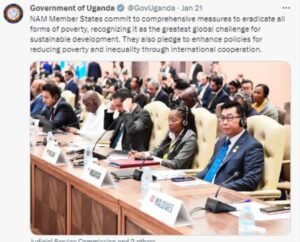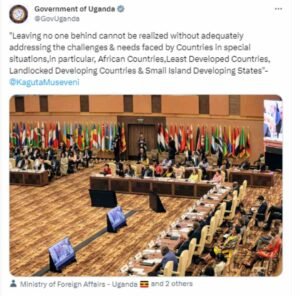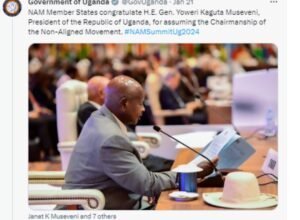Ugandan President Yoweri Museveni hailed the role of the Indian diaspora in building the country’s economy at the 19th Non Aligned Movement’s summit held in Kampala on January 21.
He highlighted the achievements made by the Indian diaspora and stated that he found out that returning Indians had contributed to 900 factories since they came back.

President Museveni in his speech mentioned India’s crucial role in the formation of the Non-Aligned Movement (NAM) and its active participation in the NAM summit held in Belgrade in 1961. He talked about the visionary leaders who initiated this historic movement and he mentioned Sukarno of Indonesia, Pt Jawaharlal Nehru of India, Nasser of Egypt, and Chou En Lai of China. He also threw light on the collective influence of these countries and even pointed out that the NAM group comprises 4.46 billion people worldwide.
The president’s statement shed light on the historical significance of India’s contributions and the collective and collaborative efforts of these nations in establishing the NAM. It also suggested the far-sighted decisions made by the leaders back then.

Admitted the regrettable actions taken by Uganda during Idi Amin’s government
President Museveni said, “NAM countries also sometimes make mistakes like here in Uganda.” He also admitted the repercussions in Uganda today as a result of Idi Amin’s actions and highlighted the adverse consequences, particularly the economic impact on Uganda. During Amin’s regime, India had cut ties due to his vehement actions which led to negative consequences for various sectors such as sugar, hotels, and steel production in Uganda. Museveni expressed regret over the lost opportunities for growth and development and stated that Amin has seriously negatively affected the country’s economy as a leader of a Non-Aligned Movement (NAM) nation.

The president acknowledged the involvement of expelled individuals in important sectors and regretted how it has caused negative effects on Uganda’s economic landscape. Despite remorse, Museveni outlined measures the Ugandan government has taken to address and rectify past injustices and showcased a commitment to overcome the challenges posed by Amin’s problematic period and foster positive growth in the nation.
He then went on to talk about the need to carefully study the investment climate in individual countries. He also reflected on the aftermath of Idi Amin’s regime and he revealed the government’s decision to return properties that were forcefully taken from Asian citizens and non-citizens upon coming into power. Despite facing numerous debates in parliament, the government insisted on restoring the confiscated properties, which highlighted a commitment to rectifying past injustices.
Museveni’s statement has underscored the importance of developing a favorable investment environment and acknowledging the need for the restoration of property rights and reparations as a crucial step in rebuilding the nation’s economic conditions.










